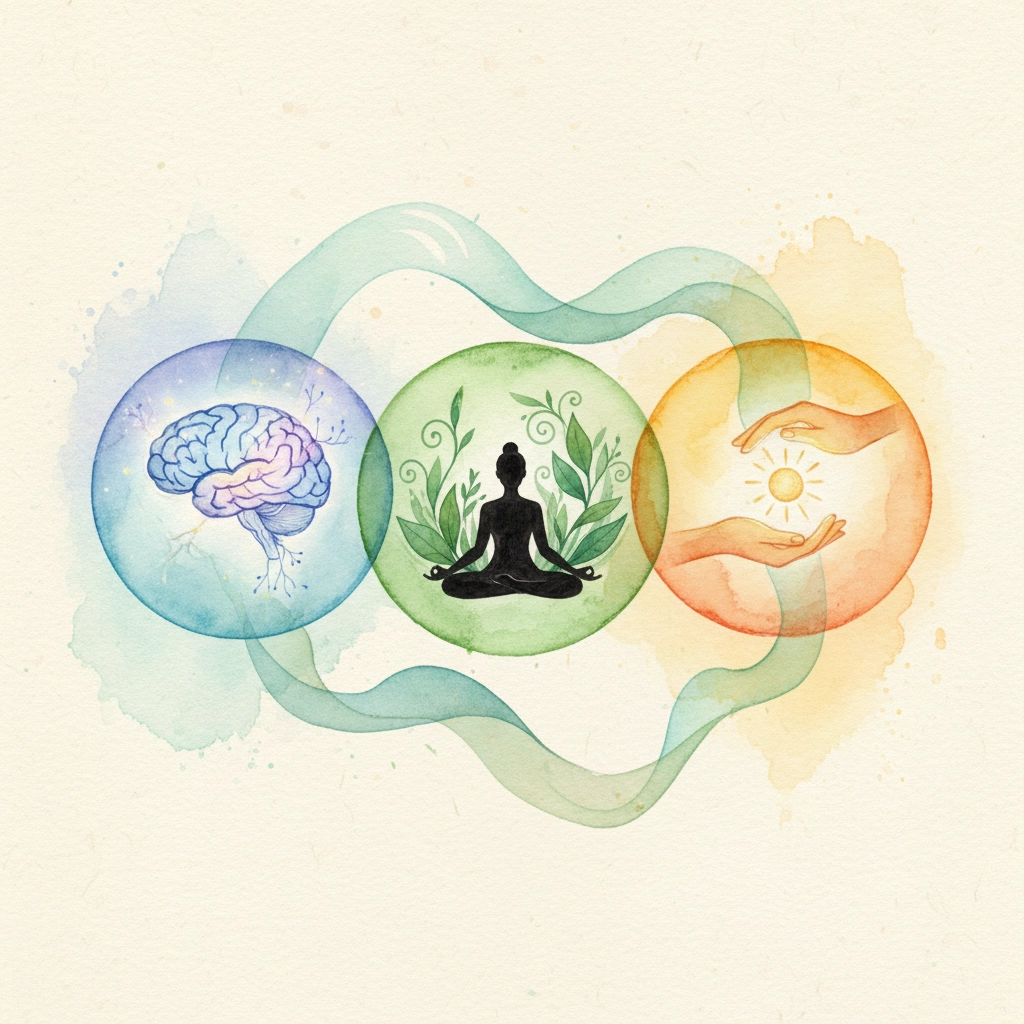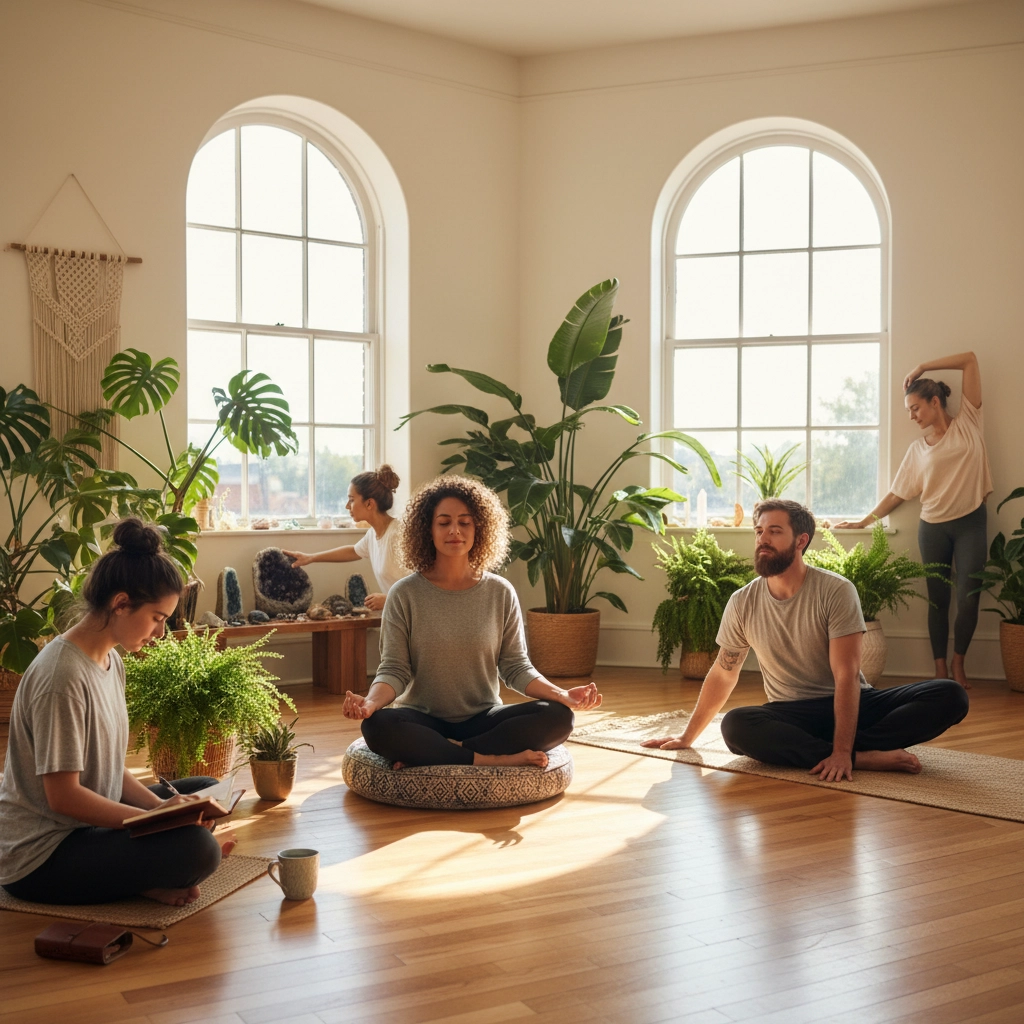The Ultimate Guide to Holistic Mental Health: Everything You Need to Succeed
- Eugene Whitten
- Nov 5, 2025
- 5 min read
Mental health isn't just about what's happening in your head. It's about your whole self, your body, mind, and spirit working together. If you've been feeling stuck with traditional approaches or want to take a more complete approach to your wellbeing, holistic mental health might be exactly what you're looking for.
Let's dive into everything you need to know about holistic mental health and how you can start using these approaches to create lasting change in your life.
What Is Holistic Mental Health?
Think of holistic mental health as treating yourself like the complex, interconnected person you are. Instead of just focusing on symptoms or putting a band-aid on problems, this approach looks at the bigger picture. It recognizes that your mental health connects to everything else, your physical health, relationships, daily habits, and sense of purpose.
The core idea is simple: you can't separate your mind from the rest of you. When you're stressed, your body feels it. When you're not eating well, your mood suffers. When you feel disconnected from your values, anxiety creeps in. Holistic mental health addresses all these pieces together.
This doesn't mean throwing out everything traditional medicine offers. Instead, it's about expanding your toolkit and finding what works best for your unique situation.
The Three Foundation Pillars

Pillar 1: Nurturing Your Mind
Your thought patterns have enormous power over how you feel. The good news? You can learn to work with your mind instead of against it.
Journaling is one of the most accessible tools you have. Writing down your thoughts helps you spot patterns, process emotions, and gain clarity on what's really bothering you. You don't need fancy journals or perfect handwriting, just start writing.
Setting boundaries might sound selfish, but it's actually essential self-care. Learning to say no to things that drain you creates space for what truly matters. This skill alone can dramatically reduce stress and improve your overall mental health.
Challenging negative thoughts through approaches like Cognitive Behavioral Therapy helps you recognize when your brain is telling you stories that aren't helpful or true. You can learn to question these thoughts and develop more balanced perspectives.
Pillar 2: Caring for Your Body
Your physical health and mental health are teammates, not separate players. When you take care of your body, your mind benefits too.
Sleep is non-negotiable for good mental health. Most adults need 7-9 hours, and quality matters as much as quantity. Creating a consistent bedtime routine and limiting screens before bed can make a huge difference.
Movement doesn't have to mean intense workouts. Even a 10-minute walk can boost your mood and reduce anxiety. Find activities you actually enjoy: dancing, hiking, swimming, or playing with your kids all count.
Nutrition affects your brain chemistry. You don't need a perfect diet, but eating regular meals with plenty of vegetables, fruits, and protein gives your brain the fuel it needs to function well.
Pillar 3: Cultivating Your Spirit
This isn't necessarily about religion (though it can be). Spiritual wellness is about connecting with something bigger than yourself and finding meaning in your life.
This might look like spending time in nature, practicing gratitude, volunteering for causes you care about, or exploring your religious or philosophical beliefs. The key is finding what gives your life purpose and makes you feel connected.
Key Holistic Approaches You Can Try

Mindfulness and Meditation
These practices help you become more aware of your thoughts and feelings without getting swept away by them. Start with just 5 minutes a day. Apps like Headspace or Calm can guide you, or try this simple technique:
Sit comfortably, breathe in slowly for 4 counts, hold for 7 counts, then exhale for 8 counts. Repeat this 3-5 times. It's called the 4-7-8 technique, and it's surprisingly effective for reducing anxiety.
Yoga and Movement
Yoga combines physical movement with mindfulness, making it especially powerful for mental health. If you're new to yoga, look for beginner classes or online videos. Even gentle stretching while focusing on your breath can help.
Creative Expression
Art, music, writing, or any creative outlet gives you ways to express emotions that might be hard to put into words. You don't need to be "good" at these activities: the process itself is healing.

Alternative Therapies
Acupuncture and massage therapy can help reduce stress and promote relaxation. These approaches work with your body's natural healing systems.
Sound therapy uses music, singing bowls, or other sounds to create a calming environment and support emotional healing.
The Benefits of Taking a Holistic Approach
When you address mental health holistically, you're not just managing symptoms: you're building resilience and creating lasting change. Here's what you might notice:
More energy and better overall health because you're taking care of your whole self
Better coping skills for handling stress and challenges
Increased self-awareness about what triggers your struggles and what helps
A greater sense of control over your mental health
Fewer side effects compared to relying only on medication
Many people find that holistic approaches help them feel more empowered and less dependent on others for their wellbeing.
Getting Started: Your Action Plan
Start Small
Don't try to overhaul your entire life overnight. Pick one or two practices that appeal to you and commit to them for a few weeks. Maybe that's writing in a journal for 10 minutes each morning or taking a short walk after lunch.
Experiment and Adjust
What works for your friend might not work for you, and that's completely normal. Try different approaches and pay attention to how you feel. Keep what helps and let go of what doesn't.
Be Patient
Holistic approaches often take longer to show results than quick fixes, but the changes tend to be more lasting. Give yourself at least a few weeks to notice differences.

Consider Professional Support
Working with counselors or therapists who understand holistic approaches can help you develop a personalized plan that fits your specific needs and situation. They can help you integrate different techniques and work through challenges that come up.
Create Daily Practices
The most effective holistic mental health approaches become part of your regular routine. This might include:
Morning meditation or journaling
Regular meal times with nutritious food
Daily movement, even if it's just stretching
Evening reflection or gratitude practice
Weekly time in nature or pursuing hobbies
Building Your Support System
Remember, holistic mental health doesn't mean you have to do everything alone. Building connections with others who support your wellbeing is crucial. This might include:
Family and friends who understand your goals
Support groups for specific challenges you're facing
Mental health professionals who take a holistic approach
Communities centered around activities you enjoy (hiking groups, art classes, etc.)
Moving Forward
Holistic mental health is about creating a life where all parts of you can thrive. It's not about perfection: it's about making conscious choices that support your overall wellbeing.
Start where you are, use what appeals to you, and be patient with the process. Small, consistent changes often create the biggest transformations over time.
Your mental health journey is unique to you. What matters most is finding approaches that feel authentic and sustainable for your life. Whether that includes therapy, meditation, creative expression, or simply prioritizing better sleep, the key is taking action and staying committed to your wellbeing.
Remember, seeking support is a sign of strength, not weakness. If you're ready to explore how holistic approaches might work for you, consider reaching out to professionals who can guide you on this journey.



Comments